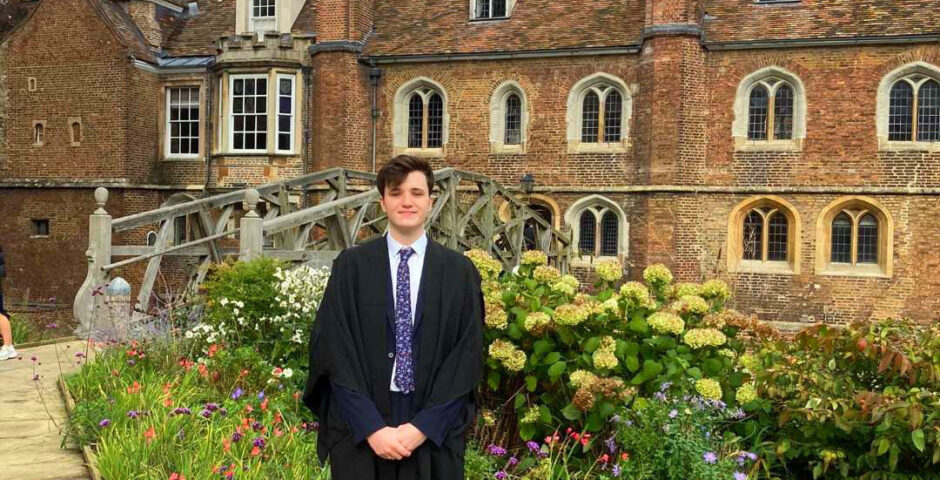
Dear freshers, no one knows what they’re doing
Apart from a privileged few, we’re all just stumbling our way through it – and that’s okay
I remember arriving at Cambridge to start my undergraduate studies, having never stepped foot in this mythical land of academic rigour and great expectations. Upon meeting my coursemates and attending the first lectures, it dawned on me that I was out of my depth. I felt like I’d just turned up to the start line of the Monaco Grand Prix in a 1996 Fiat Punto.
However, little by little, I discovered that most of the supposed F1 cars to my left and right were actually souped-up Vauxhall Corsas with dodgy aftermarket spoilers. Despite my initial fears, I was relieved to find out that most other students, like me, had no idea what they were doing.

Literally me (Image credits: kieranwhite599 via Creative Commons)
Admittedly, given that I study Human Social Political Sciences (a.k.a HSPS – thank God for acronyms), my take on Cambridge Academia may resonate more with my fellow Humanities students. Although, those who tackle STEM subjects are likely doing something more productive than reading Tab articles anyway.
Cambridge University is purpose built for a select few elite students. I believe this much is undeniable to anyone who has studied here. On paper, Cambridge is a meritocratic institution, open to all. Indeed, the entry requirements for undergraduate admissions at Cambridge are typically A*AA at A level. However, it appears that to effortlessly assimilate into Cambridge academia, you must meet the following minimum requirements: being neurotypical, upper-middle class and privately educated.
To some extent, it makes sense. Those who thrive with ease today much resemble those who once made up almost the entirety of the Cambridge student body – the well-to-do private schooler who began drafting their personal statement shortly after they finished potty training. That’s who built this place, and that’s who it’s built for.
This can be seen in various aspects of Cambridge student life. When it comes to the modes of assessment and examination, this often involves regular submission of essays of around 2000 words. These essays are generally accompanied by supervisions to discuss their content; sitting with a fellow student or two and an experienced academic, often in a grandiose and intimidating setting.
For privately educated students fresh from studying the IB diploma, a core requirement of which is an extended essay of up to 4000 words, being tasked upon arrival at Cambridge with producing regular extended essays may appear easily achievable. The same can’t be said for many state-school students, who find themselves more accustomed to producing short, formulaic responses to standardised exam questions. While private schoolers are already well versed in producing researched and referenced extended essays, many state schoolers arrive lacking this skill which is vital for success. I know I did. This is especially important at Cambridge, where extended essay writing is a core tenement of both supervisions and examinations.

At least the scenery is pretty (Image credits: Ben Carr)
Though, I would argue that this issue goes beyond the purely academic side of Cambridge. After moving into college, I found myself taking a while to adjust to living in a small, gated-off community, full of tradition, formalities and odd jargon, with a bedder knocking on my door every week to ask to clean my room. Who is going to be more comfortable in that sort of environment, a working class state-schooler or someone who attended a private boarding school throughout most of their upbringing?
I should point out that just because most of us arrive with a deficit in the capital required for Cantabrigian success, that doesn’t mean that you can’t thrive – so many of us do. My point is that those who don’t resemble the archetypical Cambridge tripos-topper have to overcome a lot of barriers in order to get there. As such, you may find yourself stumbling your way through your first few terms, feeling like you’re barely keeping your head above water. Don’t worry, just look around – so are most people.
If you’re not from an educational pedigree and you find yourself entirely at home in the world of Cambridge Academia, good for you, ignore this and crack on. Alternatively, if your education cost around the same as your average detached property in Middlesbrough (just over £275,000 according to my research), and you still don’t know what you’re doing, at least now you know you’re not alone.
Cambridge can be an unforgiving place, it works on the assumption that not only are you intelligent, but you’re not facing chronic illness, bereavement, neurodiversity, or any of the many other circumstances that can come between a successful Cambridge applicant and their dream of gleefully striding out of Senate House in one of those daft gowns.
However, for the vast majority, you make it work. No, it’s not a walk in the park. Yes, you might have a breakdown or two. But you’ll survive! You’ll get through the degree that currently looms large in front of you, year by year, and probably have the time of your life along the way. For every barrier you have to overcome, you will gain a resilience that those sailing through Cambridge with ease can only dream of.
Before you know it, you’ll be going into your third year, desperately trying to reassure yourself about your academic prospects by writing a Tab article which lets freshers in on the real secret of Cambridge – (almost) no one knows what they’re doing.
Featured image credits: Ben Carr
Recommended articles:
• Dear freshers, don’t break up just yet
• Cambridge University ranks third in The Times Good University Guide 2024
• Here’s the ultimate autumn watchlist to distract you from the realities of first term!









































